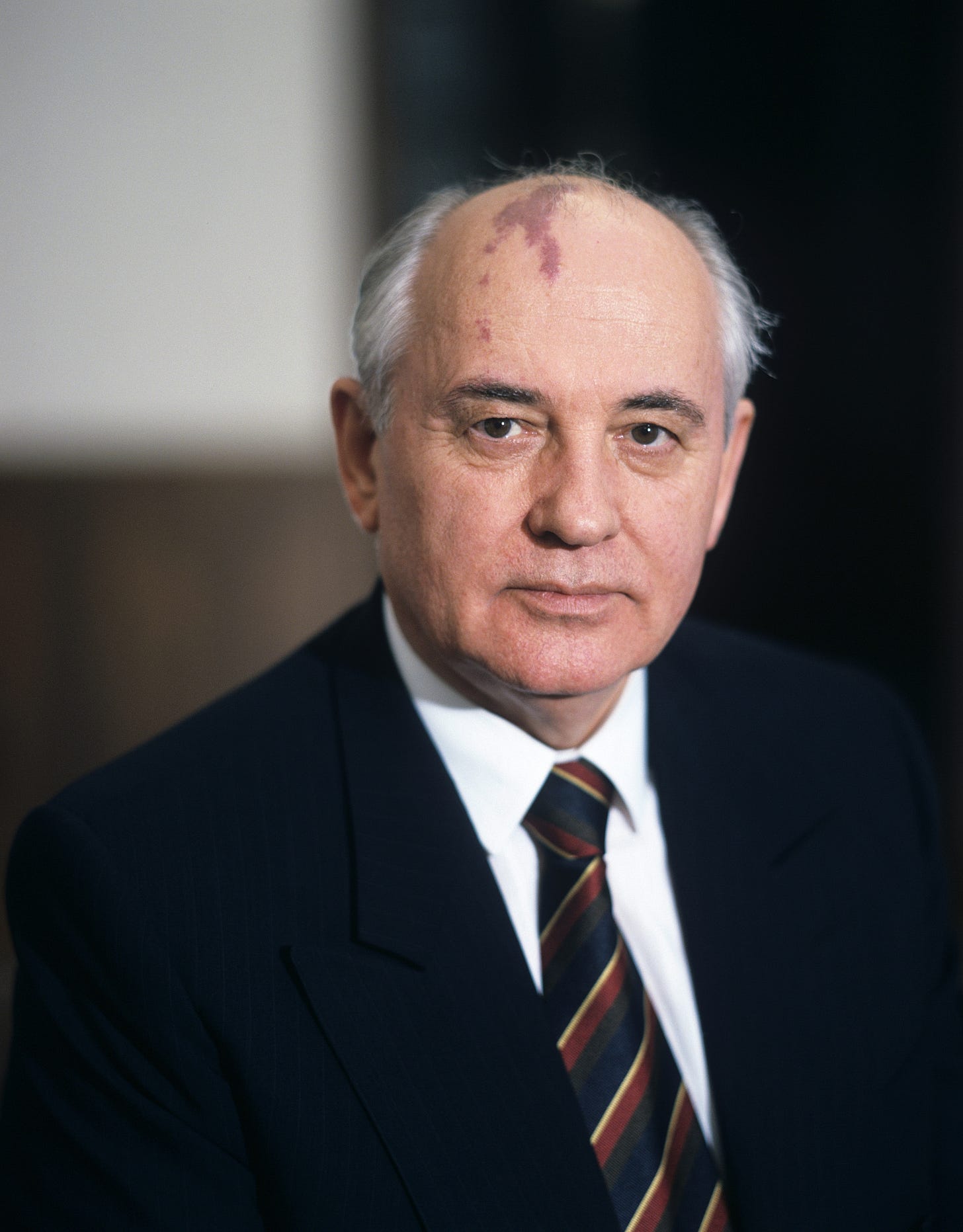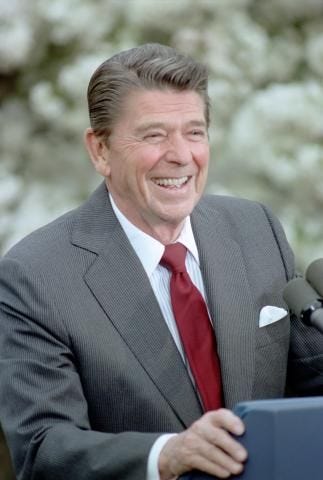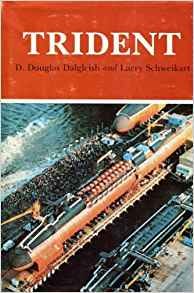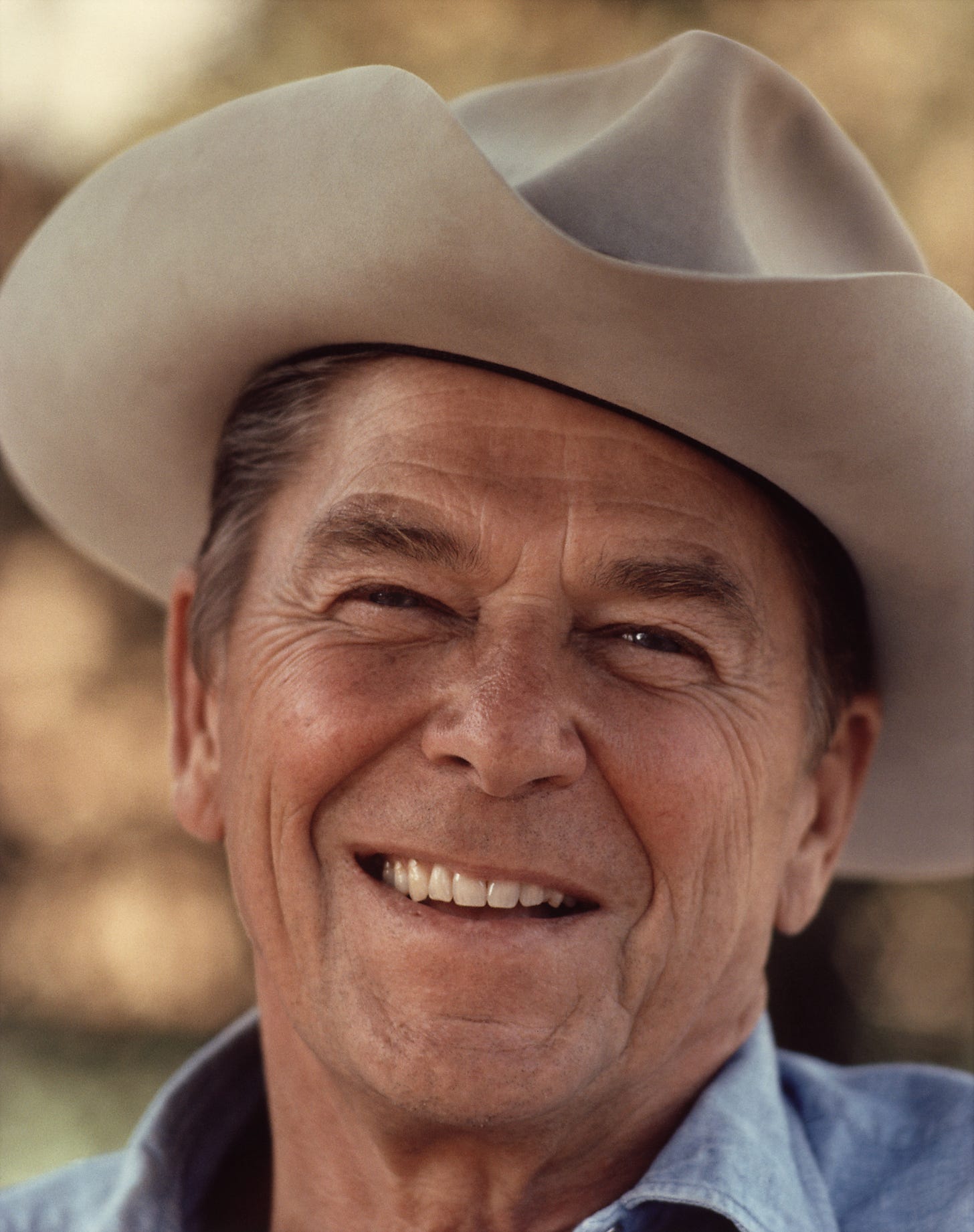Gorby and the Gipper
Despite the myth-building already in progress, Gorbachev was not quite the hero
It didn’t take long for the hagiography to begin. Already Gorvachev has been labeled the man who “ended the Cold War.” (No, that would be Ronald Wilson Reagan).) He is portrayed as a visionary who would recoil at modern-day Russia. (Actually, he’d probably celebrate it to a great degree).
A more balanced story can be found here. First, Gorbachev didn’t come into office intending to do away with the Soviet Union. In fact, in 2006, he told USA Today that “the Soviet Union could have been preserved and should have been preserved.”
Exsqueeze me? Why wasn’t it “preserved” Mr. (“Tear Down This Wall”) Gorbachev? Not because you allowed minimal freedoms to captive people, but because you could no longer prevent freedom! For context, when Gorby came in, Reagan was already frustrated that he couldn’t continue any long-running negotiations with the Soviet leaders because, as he told Nancy, “They keep dying on me.” The USSR went through three aging kleptocrats in less than five years. One of them, An-Drop-Off, was aptly named.
Two facts are critical to understand about the Reagan/Gorby relationship. First, Reagan had essentially already beaten the Soviets when Gorbachev finally came to power in 1985. That’s right. As I wrote in Reagan: the American President, Dutch had some good luck. The first Ohio-class Trudent submarine went into sea trials not long after the Gipper’s inauguration. This was an absolute game changer and immediately restored the balance of power, and indeed shifted it instantly to the United States
Professor Doug Dalgleish and I wrote about this in 1984. The Trident subs were geometric force multipliers in ways few today can comprehend. They each carried 24 ballistic missiles, each with as many as 10 nuke warheads. A single Trident within 4,000 miles of Moscow would pretty much eliminate every single Soviet city by itself.
But the second reason such subs were so revolutionary, and essentially unbeatable, was that in our own sea trials we couldn’t find them! Our antisubmarine warfare capabilities were five to fifteen years ahead of the Soviets (as we later learned when the Wall fell). The Ohio subs were so undetectable that the Navy scrapped or delayed plans to retrofit them with much longer range missiles. Why? Because we didn’t need the range anymore. We could (and occasionally did) park these babies in the Baltic sea. Instantly the Soviet advantage in missile numbers was erased, and in terms of targeting, it was vastly surpassed.
But it wasn’t all luck. By the time Gorby assumed office, Reagan had already:
*Reinstituted production of the B-1 Bomber (that Jesus Carter cancelled
*Started production and deployment of the MX “Peacekeeper” Missile (Side note: why do our weapons always sound so wimpy? I’d prefer the “AZZKICKER.” But that’s just me.)
*Ordered deployment of 454 Cruise and Pershing II missiles to offset the SS-20s in Europe
*Secretly funded the mujahadeen in Afghanistan, ultimately giving them Stinger missiles. (If you don’t think this is important, realize that when the Russkies pulled out of Afghanistan it was the first time since World War II they had been forced to relinquish territory they had conquered!
*Started a massive culture war campaign of blasting rock and roll music behind the Iron Curtain through Voice of America and Radio Free Europe. You can see the results of that in this 2010 documentary I did with Marc Leif, “Rockin’ the Wall,” where we interviewed rockers and people from behind the Iron Curtain about the impact of rock and roll.
A Hungarian escapee from communism, Leslie Mandoki, who later became both a major music producer in Germany and a friend of Gorby, had Gorbachev to his house. Gorby told him “Rock and roll was fundamental to bringing down the Iron Curtain.”
Gorby was whipped militarily and culturally before he could say “Da” when they gave him the oath of office.
But what about glasnost and perestroika? As I show in Reagan, these were not new ideas. Many in the Central Committee were already desperate to find a way out of communism without, well, ditching communism. These notions seemed to offer a means by which they could get “a little pregnant.”
Gorbachev was a trained communist, but was certainly not stupid. He knew the real numbers of the Soviet economy, as did Reagan—-though apparently many in D.C. and the CIA did not. Dutch thought one good push would collapse the whole “paper tiger” of the Soviet Union. He was right.
A good example of how Gorbachev was struggling with “reform” when nothing short of termination of communism and replacement with another system would work can be seen in my conversation in 1991 with a group of top Soviet economists sent by the government to figure a way out. “How do we get to capitalism?” they asked me and other Americans. I replied, “The government could take a steel mill, for example, estimate it’s real value, divvy up the shares among all the workers, and announce on Friday, ‘As of Monday, you are all the owners of this mill’ to prevent gouging,”
They looked at me like I was from Neptune. “You don’t understand. Nobody believes anything the government says.”
By 1991, Gorbachev knew there was no “soft landing” for the Soviet Union, and for the journalists who pretend he had negotiated one, or that there was some other future for Russia other than the unregulated thug market that emerged, well, they are kidding themselves. This in itself is an article, namely that the RUSSIA (forget the Soviet Union) never had the “four pillars of American exceptionalism” that would provide such a peaceful and prosperous transition.
No, Vladimir Putin was, like Thanos, inevitable. The system even under the Czars had no basis in law, not experience with bottom up religion or government, and had gone 70 years without the slightest enforcement of private property rights.
It’s possible that Mikhail Gorbachev made the Soviet collapse less painful. It’s certainly true that, faced with this collapse, he did not provoke a nuclear war. He deserves credit for both of those.
But to hail Mikhail Gorbachev as the man who “ended the Cold War” is a disservice to history and to the memory of the man who really made it happen and who really did “tear down that wall.”
Larry Schweikart
Rock drummer
Film maker
NYTimes #1 bestselling author
Political pundit
For even more truth-based current events, politics, and history content + resources, check out my VIP membership below
https://www.wildworldofhistory.com/vip









Excellent!
Thank you for this insightful article. Very timely information in light of the MSM propaganda in the news.